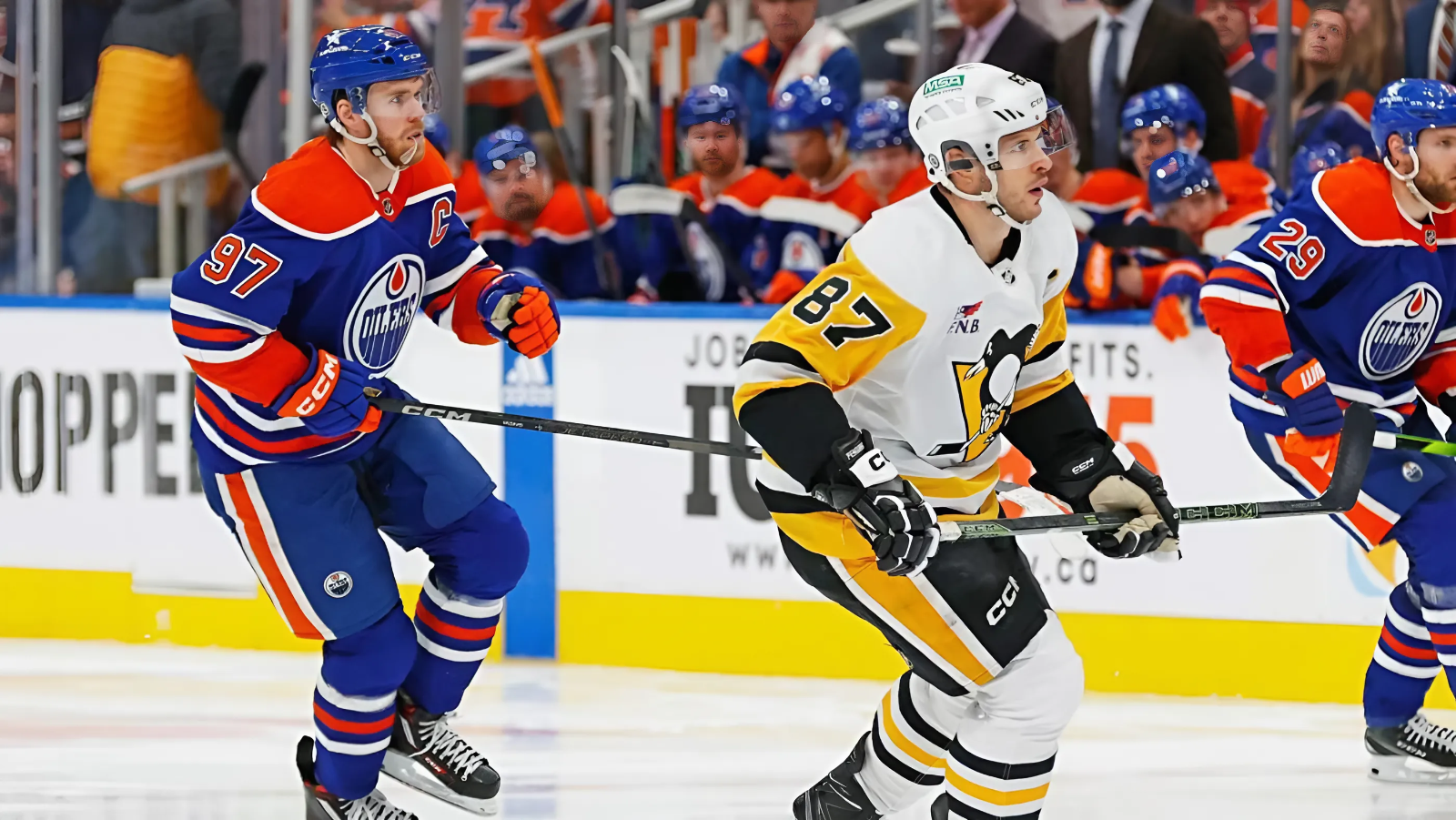In his famous profile of Boston’s iconic slugger Ted Williams, the late Pulitzer Prize winner, Richard Ben Cramer, wrote that “few men try for best ever.”

As hockey fans, we’ve been privileged to watch two contemporary prodigies try for exactly that. No matter your definition of generational talent, Sidney Crosby and Connor McDavid have owned and surpassed the expectations of the label. While both are too modest to utter the words, the pursuit of being the world’s best player has long fueled their existence.
It’s somehow been nine years since the Edmonton Oilers won the lottery that landed them McDavid, the 2015 NHL Entry Draft’s biggest fish. Nine years is a long time. It’s the entirety of Wayne Gretzky’s NHL run in Edmonton. It’s Bobby Orr’s complete career as a full-time professional athlete.
Today is the not the day to evaluate McDavid’s career against the best to ever do it, though. Fresh off a 100-assist season and record-setting playoff run, his story is still being written. But the nine-year mark is a fitting reflection point to compare his dominant career to date with Crosby, his childhood idol, at the same stage.
We’re not talking about Sidney Crosby today, the three-time Stanley Cup champion, tied with Gretzky with 19 consecutive point-per-game seasons. Rather, we want to understand how McDavid, the game’s marquee player, is tracking against the salary cap era’s gold standard in Crosby.
Through nine NHL seasons, it’s Crosby (2005-14) vs. McDavid (2015-24).
Who are you taking?
Scoring
Offense is the simplest way that the world’s greatest players separate themselves from the pack. This particular comparison is challenging since three of Crosby’s first eight seasons were abbreviated by serious injury and a fourth by a lockout and a broken jaw. McDavid, meanwhile, lost half his rookie season to a fractured collarbone and another two were shortened by the pandemic.
On top of that, the NHL’s scoring climate has meaningfully shifted in the decade or so between their primes. Crosby’s most dominant overall season (2010-11) happened in a league with only 5.46 goals per game. By McDavid’s 153-point masterpiece in 2023-23, the average spiked to 6.29 goals per game. While it might not sound like much, that 15% swing is worth around 20 points in a full season for players in this stratosphere.
Armed with era adjusted stats, we can easily correct for scoring climate and schedule length. But in this rivalry, we’ll also need to account for injuries. So, we’ll generously give each player 82 games in each of their first nine seasons to best illustrate their output.
The results are seemingly impossible…

13 goals and 10 assists — a net difference of only three points — separates the pair had they each debuted with nine full NHL seasons. On an 82-game basis, they’re both 126-point scorers in a neutral environment. Per season, Crosby scores one more goal, while McDavid picks up one more assist.
Complete equals offensively.
Team Sid might emphasize that he maintained this level while battling concussions in his prime. Team Connor may argue that he played more of the schedule (645 games to Crosby’s 550, more than a season of action). There’s certainly extra what-if vibes and therefore extrapolating of Crosby’s best years. But before, after, and during his setbacks, he sustained his peak level of production. So, it’s hardly a stretch.
Edge: Neither.
Playoffs
To many, team success is critical when defining legacies. Come playoff time, the ear muffs go on when any argument outside of winning and losing is raised. We get it. But for anyone who watched McDavid this post-season, it’s clear the best individual performance doesn’t always win the biggest team prize.
Through nine seasons, Crosby had won the 2009 title at age 21, a remarkable group comeback against a deadly Detroit outfit. While many nitpicked McDavid’s 2024 Final performance — pointless in Games 6 and 7 — it’s easy to forget that Crosby had just three points in seven games in his first Cup-winning Final. None came in Games 5, 6, or 7.

Individually, McDavid’s 133-point adjusted playoff scoring pace per 82 games comfortably tops Crosby’s (109) through nine seasons. In fact, it tops everyone not named Gretzky or Mario Lemieux. The Oilers’ captain has led the playoffs in points twice and became the second skater to win the Smythe in a losing cause.
At the same point in his career, Crosby had won 11 rounds to McDavid’s six, easily winning the franchise success side of the debate. He’d led the playoffs in points in a losing cause in 2008 and in goals in 2009. But it was Evgeni Malkin‘s sensational spring that snagged the Smythe.
Edge: Neither. Crosby had a Cup; McDavid a Smythe and a Gretzky record. At the same crossroad in their careers, it’s splitting hairs on post-season record.
Everything Else
Trophy Case
Through nine seasons, here’s each mega-talent’s regular season haul of awards and honors:
- Crosby: Hart (2), Lindsay (3), Ross (2), Richard (1); Year-End All-Star selections (4); All-Rookie Team; and a superfluous Messier Award for good measure
- McDavid: Hart (3), Lindsay (4), Ross (5), Richard (1); Year-End All-Star selections (7); All-Rookie Team
Edge: McDavid, with the major caveat that eight of his first nine seasons were healthy (to Crosby’s five).
International Play
While it’s disappointing that McDavid has yet to play traditional best-on-best hockey at age 27, Crosby distances himself here.
At 22, he scored perhaps the most famous goal in his sport’s history. On home soil. With more than 26 million Canadians watching. In a country with a population of 34 million at the time. Unmatchable. He followed it up by captaining Canada to 2014 Sochi gold, scoring a pivotal goal in the final game.
Edge: Crosby, with an exclamation mark.
Defense ⛔
Defensive reputations are often created by some strange mix of perceived effort, Selke votes, faceoff success, being deployed to kill penalties, or anecdotal plays like a well-timed blocked shot. None are great indicators of defensive impact.
We have the public data to know that Crosby and McDavid both spent time near the bottom of the NHL defensively in their early to mid-20s. Promising forwards expected to turn around franchises (hello, Connor Bedard) naturally trade chances early in their careers.
It’s McDavid that’s a couple of years ahead of Crosby’s progress in terms of isolated defensive impact at even-strength, having quietly crept into the upper quarter of the league last season.
Edge: Neither. Over the course of their first nine seasons, each thoroughbred’s defensive impact rates below-average in aggregate.
Impact ⚡
McDavid, a gazelle on skates, is the most highly evolved player on ice by the eye test. Physically peerless. He’s opened our minds to human potential of speed and finesse. Despite the backhands off water bottles and unprecedented feats of eye-hand coordination, this is not something said about Crosby.
Yet, McDavid has never been called a grinder at heart like Pittsburgh’s captain. Nor did he help resurrect the sport after a lost season destroyed global fan morale. It’s Crosby’s trendsetting combination of ability and dogged work ethic that’s made tenacity a prerequisite for superstardom today.
Edge: Neither — both have changed the sport in their own style.
The Decision
They were born a decade apart, and their recent head-to-head meetings have often felt more like marketable TV than meaningful showdowns. Less Larry Bird vs. Magic Johnson and more Novak Djokovic vs. Roger Federer — one player at the peak of his powers against one having vacated his prime. That’s to be expected.
Some will argue that McDavid is simply too skilled, has put up too many points, and has been too healthy not to have passed Crosby at the same point in his career. Opposing narratives say that Crosby’s style of play lends itself to winning and that, absent a Stanley Cup or signature international moment, McDavid’s legacy to date is woefully incomplete.
The analysis shows us that from a productivity perspective the two have been eerily similar after nine years — adjusted stats correctly bridge Crosby’s perceived scoring gap, while McDavid’s playoff output negates lesser team success.
We’re calling it a draw — an unsatisfying but appropriate verdict.
The Future
Where McDavid goes from here will be most revealing. Crosby’s ninth season was the last where he dominated statistically. But he won two more Cups as playoff MVP, a World Cup as MVP, squeezed out another Rocket, was runner-up for the Hart Trophy three times, and remained an elite player through his 37th birthday. Most importantly, he’s been healthy the last decade — an improbable outcome when he was 25.
Can McDavid do the same on the back side of his career?
If he’s healthy, we’ve seen no reason to think otherwise. But as his godly tools slowly tarnish, he’ll need to have another exceptional nine years and likely a title or three to satisfy the masses and surpass the generational talent that came before him.
Regardless of the final answer, watching two unique and relentless talents both capable and motivated enough to try for best ever has been a gift.





